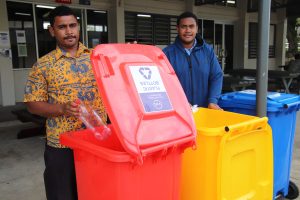

FNU students Epeli Vakaloloma (left) and Samuela Yalayala using the recycle bins provided at the campus.
The Fiji National University (FNU) has been recognised in the Annual Sustainable Development Goals (SDGs) Accord Report 2022 for the Integration of SDGs in student engagement activities.
FNU was acknowledged for promoting SDGs 12 Responsible Consumption and Production and 13 Climate Action.
The report released recently stated “The University recognised a need for a transformative vision for their waste management system – one that is inclusive, more equitable, and reflects the urgency of climate change. All members of the University community have been expected to work together and utilize the waste recycle bins and promote the University’s effort in managing waste disposals into the allocated waste recycle bins. The University has adopted approved waste management plans and initiated the waste recycling plans as per the plan.”
The SDG Accord is a prominent international initiative developed by the Global Alliance to enable the tertiary education sector to demonstrate its commitment to contributing to the achievement of the SDGs and sharing best practices. This partnership project, which started at the end of 2017, has the support of the UN and other global partners.
As a signatory of the SDG Accord with The Environmental Association for Universities and Colleges Education, the Fiji National University (FNU) has strengthened its pledge to contribute toward the SDG. The University’s commitment to the Sustainable Development Goals facilitates the exchange of knowledge amongst universities around the world and reports the University’s contribution to the global effort.
FNU recognised the need for an inclusive, more equitable waste management system implementing the three Rs – reduce, reuse, and recycle – to address its campus waste management that reflects the urgency of climate change and establishing greener campuses was commended in the report.
Acting Vice-Chancellor Dr William May applauded the collective efforts of the university community to work as one and achieve the commitment outlined in the SDGs.
“Fiji is recognised worldwide for its leadership and advocacy on the issue of climate change. FNU is deeply committed to the achievement of the UN Sustainable Development Goals (SDGs), and to developing cost-effective, scalable solutions aimed at sustainability, resilience and climate change adaptation, in support of the objectives outlined in Fiji’s Climate Change Act 2021,” said Dr May.
“FNU recognises the immediacy of the climate emergency, and the need for systemic change, and has placed environmental sustainability as an all-encompassing theme of our Strategic Plan 2021–2026.”
Epeli Vakaloloma, a first-year Bachelor of Education student, stated that the waste recycle bins initiative by the University has greatly assisted students in their learning in a clean environment.
“The waste recycle bins serve a purpose, and I believe that all of the students are using them responsibly to dispose of their trash appropriately,” Vakaloloma stated.
Another student, Samuela Yalayala, suggested that all Fijians should care for the environment to mitigate the effects of climate change.
“Fiji is a climate change leader, and we should all do our part to ensure that trash is disposed of properly. We should be accountable for our actions that affect others and the environment. If we do not dispose of bottles and other wastes responsibly, it can harm the marine ecosystem and our environment,” Yalayala commented.
Niranjwan Chettiar, the Director of the Division of Capital Projects and Infrastructure and chair of FNU’s Sustainability Initiatives Committee said being recognised in the report was a boost to the joint efforts of addressing the SDGs.
“This is certainly great news. FNU’s Sustainability Plan provides a strategic guideline on embracing the strengths of past accomplishments and maximising the opportunities to provide a consolidated effort of the University and its stakeholders,” said Chettiar.
The University’s sustainability targets include: